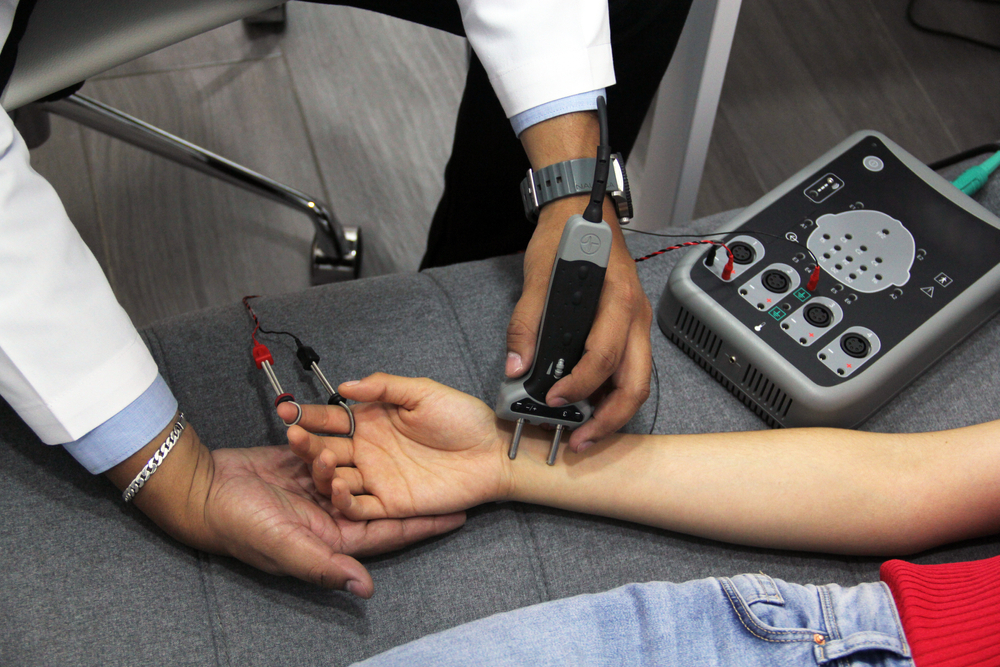Numbness in your legs and feet might be uncomfortable and inconvenient, but it’s typically nothing to be concerned about. You may lose sensation in one or both of your legs or feet if you sit or stand in the same posture for a long amount of time. Simple numbness like this may usually be treated on your own and restored in a matter of minutes. If you can’t figure out why you’re numb, or if it lasts longer than an hour, see your doctor. They can help you figure out what’s causing your numbness and how to treat it properly.
- Method 1: Trying Home Remedies
- Method 2: Seeking Medical Assistance
- Call your regional emergency number if you have more serious symptoms.
- If you can’t figure out what’s causing your numbness, see a doctor.
- Take blood tests to check your vitamin levels and to look for contaminants.
- Check for nerve damage with nerve conduction testing.
- Take medications to help you feel better.
- Method 3: Preventing Numbness
- Warnings
Method 1: Trying Home Remedies
To figure out what’s causing the numbness, apply the elimination method.
Numbness in the legs and feet can be caused by a variety of factors. You’ll be able to cure your numbness more effectively if you can remove as many of these reasons as possible.
If you were sitting with your legs crossed, for example, you may uncross them or extend them out. If you were sitting on your feet, though, simply releasing them and moving them about may be enough to restore feeling.
Numbness in your legs and feet might occur if you have a persistent back ailment or have just experienced an acute back injury.
Tip: Check for bug bites on your legs and feet, especially if you’ve been outside recently. Toxins from insects can induce temporary numbness.

Increase blood flow by massaging your legs and feet.

In a circular motion, gently rub the numb areas of your legs and feet. Applying pressure and kneading motions may also be beneficial.
Make sure you’re not massaging too thoroughly. You can unknowingly injure yourself since you won’t be able to determine when the pressure is too severe if you don’t have feeling in your leg or foot.
Wear clothing that is looser and less restricting.

Tight clothes may be obstructing circulation in your legs and feet. Similarly, wearing shoes that are excessively tight might cause your feet to get numb.
Check the top seam of your socks or stockings to see whether it’s too tight. It might be cutting off blood supply to your ankles and feet if it causes an indentation in your skin.
Change your body position more frequently.
If you sit or stand in the same posture for too long, your legs and feet will get numb, especially if you’re sitting with your legs crossed or your feet beneath you. Circulation is improved by moving around and changing your weight often.
It’s often preferable to shift positions before your legs and feet get numb. You’ll feel more relaxed, and you won’t have to cope with the agony of waiting for your legs or feet to “wake up.”
Take vitamin supplements if you are suffering from a vitamin deficiency.

Numbness, especially in the arms, hands, legs, and feet, is a common symptom of vitamin deficiency. Numbness or an uneven stride, often known as ataxia, can be caused by B-complex vitamin deficits. It can also be caused by a lack of potassium, calcium, or salt.
Unless you have an underlying disease or have reduced your intake for a few years, such as if you’re a vegetarian or vegan, you’re unlikely to develop a B-12 shortage.
If you’re currently taking a multivitamin, a vitamin deficit is less likely to be the source of your numbness. You can, however, ask your doctor to check your vitamin levels in your blood to be sure.
Method 2: Seeking Medical Assistance
Call your regional emergency number if you have more serious symptoms.

Numbness in the legs and feet is a common occurrence with a simple reason. This numbness, on the other hand, might be an indication of a more serious health concern, such as a stroke, which need quick medical attention. If you observe any of the following symptoms together with numbness in your legs and feet, get emergency medical attention:
Inability to move or weakness
A terrible headache that appears out of nowhere
Inability to regulate your bladder or bowels
Confusion or loss of consciousness are also possible outcomes.
Slurred speech, trouble speaking, or a change in eyesight are all signs that something is wrong.
If you can’t figure out what’s causing your numbness, see a doctor.
If you can’t figure out why your legs and feet are still numb despite your best attempts to address the condition at home, your doctor can assist. Tell your doctor all you know about your numbness problems, including how it started, how long it lasted, and what you did to attempt to stop or avoid it. Your doctor will try to figure out what’s causing the problem. Your symptoms should go away after the underlying reason is addressed.
Diabetes mellitus, carpal tunnel syndrome, and a compressed nerve in your back are all typical illnesses that your doctor may rule out.
Tell your doctor about any recent illnesses, injuries, or infections you’ve had, as well as the treatments you received. You should also inform your doctor about any drugs, vitamins, or herbal supplements you’re currently taking. Some medicines and supplements might cause numbness as a negative effect.
To evaluate your risk of having a stroke, your doctor may ask questions about your medical history and the medical history of your family.
Take blood tests to check your vitamin levels and to look for contaminants.
Your doctor may request a series of blood tests based on your medical history and other symptoms. These tests will reveal if your numbness is due to a toxin, heavy metal poisoning, or a vitamin deficit. Based on the findings of these tests, your doctor will prescribe vitamins or drugs.
These tests can also aid your doctor in determining whether or not your thyroid and liver are in good working order. Numbness in your legs and feet might be caused by problems with either of these organs.
If your doctor discovers a vitamin shortage, they will most likely prescribe supplements to make up for it. Following your doctor’s directions for taking these vitamins should help you feel better in a few days.
Tip: If your doctor suspects a stroke or mini-stroke, imagining tests may be ordered. Make sure you understand your doctor’s suspicions and what they might signify for your long-term health by asking questions.
Check for nerve damage with nerve conduction testing.

Adhesive patches with electrodes are applied to various regions of your legs during a nerve conduction test. Your doctor will assess the muscle’s reaction after each patch stimulates the nerve beneath it. While this test may produce some discomfort, you should not experience any pain as a result of it.
Because a nerve study is an intrusive operation, it’s typically only done if your doctor can’t find the problem any other way.
This test’s abnormal results suggest that you have nerve damage or destruction in your legs, which is most likely the cause of your numbness. A specific ailment, such as diabetic neuropathy or Guillain-Barré syndrome, may be linked to nerve injury.
If nerve conduction tests reveal damage, your doctor will investigate the source of the problem. The nerves will most likely mend and you will have reduced numbness after that reason is addressed. If you suffer nerve damage as a result of high blood sugar, for example, reducing your blood sugar will alleviate the numbness in your legs.
Take medications to help you feel better.
Medications may be prescribed to treat the underlying cause of your numbness or to alleviate your symptoms, depending on what your doctor decides is the reason of your numbness. The drugs that are prescribed for you are determined by the cause of your numbness, as well as your general health and usual lifestyle.
If your numbness is caused by peripheral artery disease, for example, your doctor may prescribe drugs to address any underlying disorders that are contributing to the disease, such as high cholesterol, high blood pressure, or high blood sugar.
Long-term nerve disorders can occasionally be efficiently treated with antidepressants and corticosteroids.
Method 3: Preventing Numbness
Exercise and diet to lose weight if you are obese.

Obesity is defined as a body mass index (BMI) of higher than 30. It can cause numbness in your legs and feet by reducing circulation. Obesity also raises your risk of diabetic neuropathy, which can cause numbness in your legs and feet if you have diabetes.
Your doctor can assist you in developing a diet and activity plan that will help you lose weight and keep it off in the long run. You may even hire a nutritionist or a personal trainer to help you reach your objectives.
Plan to exercise for at least 30 minutes most days and eat complete foods that include lots of fruits and vegetables.
Tips: To get your legs moving if you have numbness in your legs and feet, try walking, stationary cycling, or swimming. If you move your legs more, you may notice that numbness occurs less frequently.
If you’re a smoker, create a plan to quit.

Smoking causes your arteries to shrink and stiffen, reducing blood flow to your legs and feet and causing numbness. Smoking harms your nerves as well. Tell your doctor that you wish to quit smoking if you do. They will assist you in devising a strategy to progressively reduce your intake before quitting.
You’ll have a greater chance of stopping for good if you cut back before stopping and then use a nicotine replacement medication, such as a patch or gum, to aid with cravings after you quit.
You might also try picking up a new pastime to keep your hands occupied and prevent the need to smoke from developing.
Make it a habit to exercise on a regular basis.
Exercise on a regular basis will assist you to enhance your blood flow and general fitness. Even if you aren’t overweight, you need exercise to maintain your health.
The healthier your circulation is, the more active you are. If you experience numbness in your legs and feet owing to poor circulation, cardiovascular activity is extremely beneficial.
Incorporate physical activity into your daily routine as well. For instance, instead of taking the elevator, you may take the stairs or park further away from your destination and walk across the parking lot.
To increase your circulation, try alternative therapies.
Alternative therapies like acupuncture and massage therapy might help you feel less numb by boosting circulation in your legs and feet. Consult your doctor to see whether any of these treatments are appropriate for you.
You can usually make an appointment with a practitioner to discuss your problems and see whether their therapy therapy might be beneficial to you. You may also talk about how many sessions they recommend and how much they’ll charge at that time.
Alternative therapies aren’t often covered by private health insurance policies, so if you choose this path, you’ll likely have to pay for the treatments out of pocket.
Warnings
Never start taking any vitamins or supplements without first consulting your doctor, and never stop taking any prescribed medication without first consulting your doctor.
Also Read: Know How to Calculate Your Body Age- With Detailed Instructions – V Cure (vcurehealthcare.com)





